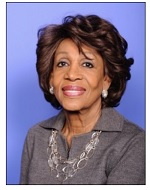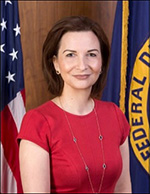By Pam Martens and Russ Martens: December 27, 2021 ~
Maxine Waters is the Chair of the House Financial Services Committee. That Committee oversees the nation’s banks, including the megabanks on Wall Street that are serially charged by prosecutors with ever creative ways of looting the public. Waters’ Committee also oversees the bank regulators, which are frequently “captured” by Wall Street. One of those bank regulators has now come into the cross hairs of Waters.
Typically, if one is a captured bank regulator, one goes to extreme lengths to hide that fact. Thus, it is unusual that the Chair of the Federal Deposit Insurance Corporation (FDIC), Jelena McWilliams (a Trump holdover), has decided she has the power to run the federal agency with an iron hand and overturn the will of her Board of Directors. Even more unusual, McWilliams is engaging in this battle with her Board in public.
We’ve seen plenty of nasty corporate board battles over the years but this is the only time we can recall that the Chair of a federal banking regulator has taken the position that she, unilaterally, can override a decision voted favorably on by a majority of her Board of Directors.
The FDIC is the federal bank regulator that oversees federal deposit insurance and sends examiners into the banks that are federally insured in order to maintain their safety and soundness. The fact that three large, federally-insured banks in the U.S. (Citigroup, Wachovia, and Washington Mutual) blew themselves up during the 2008 financial crisis, suggests that exactly how the FDIC conducts its oversight of these institutions, and just how large and unmanageable it allows them to become, is a serious matter for Congressional oversight. (See OCC Says JPMorgan Chase Has $29.1 Trillion of Custody Assets; That’s $8 Trillion More than the Assets of All Banks in the U.S.)
House Financial Services Chair Waters has now stepped into the ring to stop the FDIC’s McWilliams from delivering a knock-out punch to her Board of Directors on the issue of how large bank mergers are being rubber-stamped by bank regulators. Last week, Waters sent a five-page letter thrashing McWilliams over her recent “obstructionist acts” to overturn the decisions of the Board of Directors of the FDIC and demanding that she provide the legal basis for her actions. Waters wrote:
“Following a 2018 deregulatory rollback of the Dodd-Frank Act’s enhanced prudential framework that applies to the largest banks, and as experts warned would happen in its aftermath, we have seen an acceleration of proposed and approved mergers in recent years creating even larger banks — including mergers of BB&T with SunTrust, First Citizens with CIT, and U.S. Bank with MUFG Union Bank. Unfortunately, there is evidence that regulators’ rates of approving pending merger applications has accelerated, even as the trend of large regional bank consolidation has picked up at a concerning pace. Communities directly affected by bank consolidation need access to financial services in order to recover from the pandemic, and we need a bank merger review framework that takes into account these dynamics.”
Waters demanded answers from McWilliams to her letter by January 21 and asked her to “stop these obstructionist acts and join the bipartisan efforts underway to strengthen the bank merger review process to ensure it is being conducted in the best interests of workers, consumers, and communities throughout the country.”
Prior to last week’s letter, Waters had sent a shot over the bow to McWilliams by releasing a public statement on December 16 which included this text:
“As I wrote last week, and at a time when a wave of megamergers is making our banking markets less competitive, I welcome the long-overdue steps by banking regulators to finally update their bank merger review procedures. However, I am deeply concerned by recent actions taken by the FDIC Chairman to — in an unilateral, unprecedented, and potentially unlawful move — attempt to thwart the will of the majority of the FDIC to seek public input on this matter. I am calling on Chairman Jelena McWilliams to explain her legal authority for attempting to veto this action approved by a majority of the FDIC Board, including by apparently directing agency staff to issue a public statement disavowing the sensible request for information from the public, and subsequently rejecting a motion to include the notational vote authorizing the request in the minutes at this week’s board meeting.”
There appears to be something highly unusual (and unseemly) afoot when it comes to Wall Street megabanks and their regulators in Washington. Saule Omarova just removed herself from consideration to become the head of the Office of the Comptroller of the Currency, the regulator of national megabanks like Citigroup and JPMorgan Chase that operate across state lines, after her bizarre proposal for radically redesigning the financial system to move all bank deposits from commercial banks to the Federal Reserve and eliminate FDIC insurance was published in a legal journal. It didn’t help either when it was revealed that Omarova, the nominee to oversee banks with $14 trillion in assets, had been arrested at age 28 for shoplifting.
Now we have the head of the FDIC (that Omarova proposed eliminating) taking the nutty position that she has the authority to override the votes of a majority of her Board of Directors.
Then there is the strange lack of vetting of the head of the criminal division of the U.S. Department of Justice, Kenneth Polite, whose division decides whether to prosecute the Wall Street megabanks or simply continue to hand out deferred prosecution agreements for criminal acts like parking tickets for being 30 minutes overdue on your meter.
It’s long past the time for Maxine Waters, and the Chair of the Senate Banking Committee, Senator Sherrod Brown, to start connecting these dots in a public hearing – and forcing all individuals to give their testimony under oath. It’s the names of the people sitting in the shadows and pulling the strings that Americans need to hear about.



